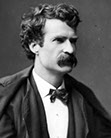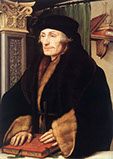
Samuel refers to the great American writer and humorist Samuel Clemens (Mark Twain 1835-1910) who lived, observed, and wrote during a period of flourishing in the arts and education in the U.S. It was also a time of grand expansion and terrible internal war—a time of actions that would challenge its foundational ideals, leave a wake that would require prolonged healing, and deeply mark a young country’s personality and future. The U.S. was like Clemens’ orphan-boy hero, Huckleberry Finn—restless, on a journey whose end was in shadows, and

Among his vast number of beautiful writings, Praise of Folly is best known. Both he and Clemens were quite capable of playing the “wise-fool”—that character who, in the court of kings or in the town plaza, often speaks in stories and songs, is quickly dismissed by the worldly-wise, but is discovered by those with “ears to hear and eyes to see” to be prescient, challenging, and profound.

Clemens as a namesake notes the importance of place, of connecting to and of understanding the American roots. Similarly, Erasmus notes the importance of the Western Tradition and of Christian Humanism. Collectively, each in his own way, they note the vital importance of raising those questions, of searching for those answers, and of taking the actions that shape a person, a community, and a country. These men—great, but like all of us flawed and yet never with the pretension of appearing perfect—struggled. And, in their most driving yearnings and efforts for what is truly meaningful, beautiful, true and good, they left us tremendous gifts and marks of a path. As referenced in our mission statement: at their best and most true, their persons, spirits, styles, and pursuits mark what and how SEi aims to be.


traveling with a variety of unlikely companions who were not always what they seemed or who the time’s conventions and prejudices said they were.
By way of the Mississippi River—the American Father of Waters—Huck’s journey, while ever humorous and ironic in its narrative, raises profound human questions and none more central and personal to Huck than those of freedom, friendship, justice, and conscience.
Erasmus refers to the European Christian humanist and intellectual Desiderius Erasmus of Rotterdam (1466-1536). He was a witty and scholarly man of letters who at times ran in the highest circles but was not consumed by them. While skeptical of the crowd and “public opinion,” like Clemens, he was wildly popular and had a profound respect for common man. He was the foremost voice and actor for translating Sacred Scripture into the vernacular so as to make the person of Christ and his teachings available to all. And, he, perhaps most importantly, had deep and affectionate friendships—none greater than with Thomas More.

He too lived, observed, and wrote in a time of great flourishing in the arts and learning and a time of great violence and crossroads. And, he dared to challenge the prejudices, injustices, and wrong-headed conventions of his time. Not with the goal of destruction or of constructing a utopia that could only exist in an idealist’s mind and never on earth, he challenged with the goal and hope of healing and of educating persons capable of affecting a more just, natural, imaginative, truthful, and harmonious society than what they found. (For example, he and More boldly advocated opening the doors of liberal arts learning to women).
© 2019 Samuel & Erasmus institute. All Rights Reserved
SEi is a Federal 501 (c) (3) tax exempt public charity. Contributions are tax deductible.










